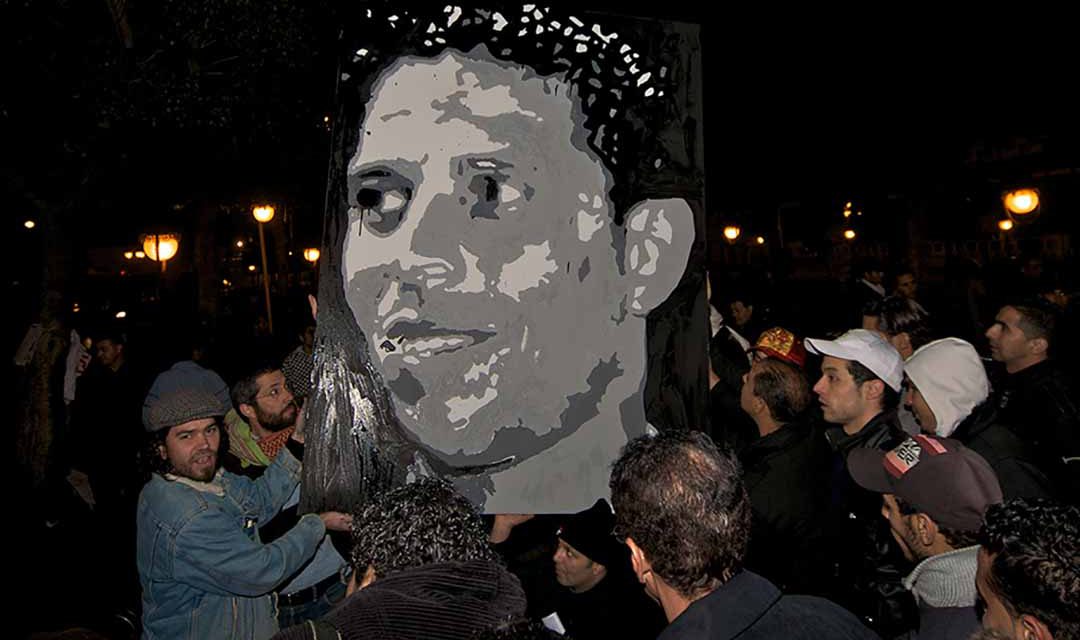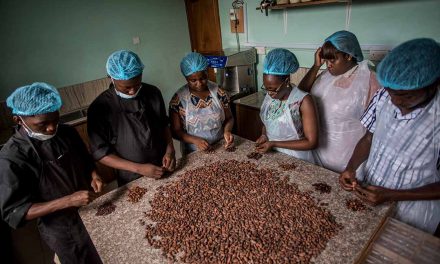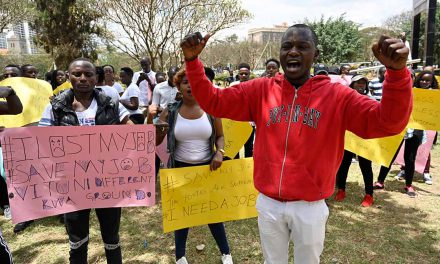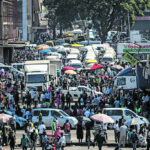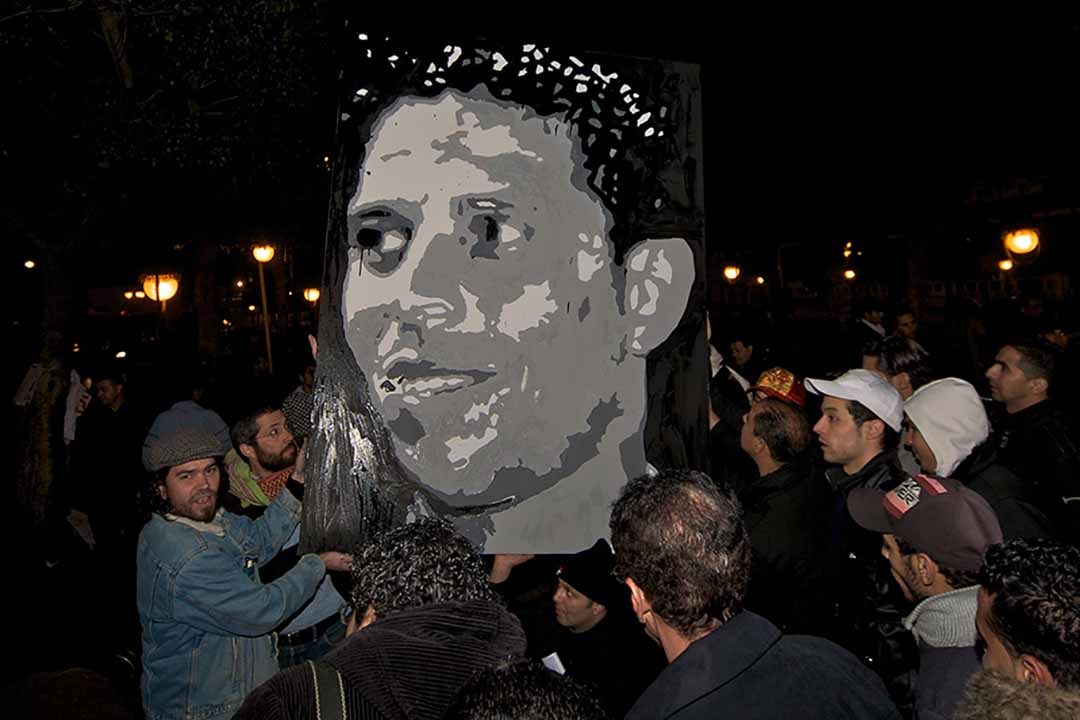
Portrait in memory of Mohamed Bouazizi, Avenue Habib Bourguiba, Tunis. © Chris Belsten, Creative Commons
Tunisian police have been cracking down on informal traders.
In December 17, 2010 Mohamed Bouazizi, a street vendor aged 26, set himself on fire in Sidi Bouzid, in the centre of Tunisia. His act was a desperate protest against the police, who had confiscated his cart with the fruits and vegetables he sold to make aliving. His death, 18 days later, unleashed protests all over the country against injustice and “inequalitiy, and for employment, freedom and dignity”, as protesters chanted during the revolution that followed.
This was the beginning of the Arab Spring, which saw massive protests against governments around the Arab world. President Zine El Abidine Ben Ali eventually fled the country on January 14, 2011, ending a 23-year long dictatorship.
Since the revolution, the informal economy has flourished in Tunisia. The informal economy, indeed, accounts for around 35% of GDP, says Radhouane Erguez, an expert in public policy and the head of the socio-economic department at the Tunisian think tank Joussour, which published a report on this question in June 2016, based on official data.
“It is a very normal rate for a developing country, but what is worrisome is that it is growing faster than GDP and employs half of the workforce,” he says.
Informality also results in the loss of about TND4 billion ($1.62 billion) in value added taxes, including some TND1.2 billion ($49.7 million) attributable to smuggling, says Erguez. Only around 30% of the country’s micro- enterprises, which are mainly owner-operated, are registered, and the sector faces very little state control, with businesses paying low rates of tax. The rest, or more than 70%, are not registered and therefore operate illegally, like street
Until recently, the central market in Tunis was full of young men selling all manner of cheap goods – clothes and toys made in China, costumes, jewellery made in Turkey or household products – displayed on improvised stands or pieces of cardboard on the ground. But Omar Mansour, the governor of Tunis, has decided to put an end to street vending in the city, objecting to “the anarchic stalls”.
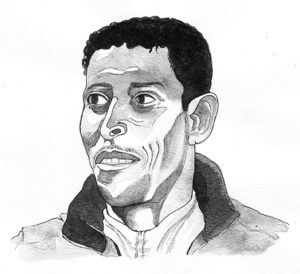
Mohamed Bouazizi. Illustration: Vusi Malindi
On July 3, 2017, the police cracked down on street vendors in Tunis, chasing them away from the main streets of the capital. Not unexpectedly, given recent history, clashes erupted, during which two policemen were hurt, and 47 street vendors arrested.
The day after the crackdown, the streets around the central market were unusually quiet. There were police everywhere, and one could hear passersby congratulating policemen for “cleaning up” the streets.
Most of the street vendors had not returned, but Achraf*, a young man of 19, who sells bracelets made of plastic pearls, was among the few who had returned to work, despite the crackdown. “I have no choice,” he told Africa in Fact. Only four vendors were plying their trade in the street where he usually worked, as compared to around 30, he said.
Achraf is from Jelma, a small town near Sidi Bouzid. Like the vast majority of street vendors, he comes from a poor background and was forced to leave his home region to feed his family. “I left school and started to work as a street vendor when I was 13, a few months before the revolution,” he says. “I have five siblings and my parents are ill and unable to work.”
Achraf did not participate in the protest after the crackdown. “I don’t want to go back to jail,” he says. A few months before, he spent a month and a half in prison. Legislation adopted in 2016 set a penalitiy of up to three months’ imprisonment and 1,000 dinars fine for “infringements of the regulations relating to hygiene and public cleanliness’’. The ostensible aim was to protect the environment, but the legislation has been used to put street vendors in jail.
“I am afraid,” says Achraf. “But I am used to being afraid now.” To keep his business operating, he sometimes pays the police to leave him alone. “Sometimes they ask me for five dinars ($2) ‘baksheesh’ every 30 minutes,” he says.
Achraf says the protests that led to the ousting of Ben Ali’s government have not changed things for street vendors, even though they were sparked by Bouazzizi’s tragic death. “Working has been even more difficult since then,” he says. “Before the revolution, it was easier for me. At that time, when the police confiscated my wares, they gave them back to me at the end of the day. Now they beat us, throw away our wares, impose fines on us and throw us in jail.”
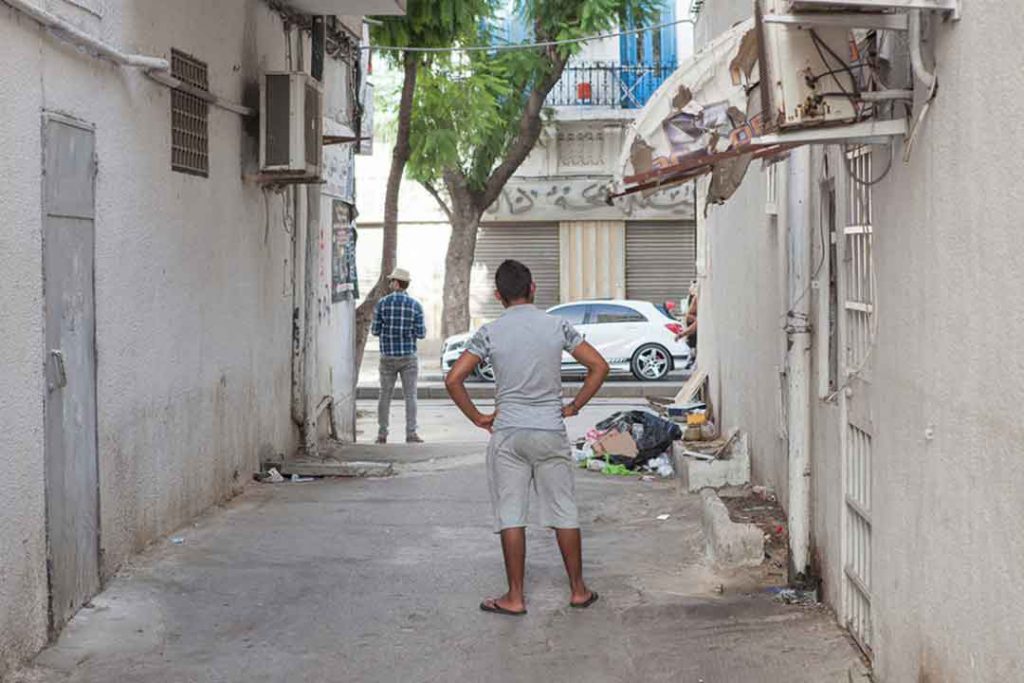
Achraf in a Tunisian street © Sebastian Castelier
During the dictatorship, as Ben Ali’s 23 years in power are colloquially known in Tunisia, smuggled goods and illegal imports from Libya and Algeria – clothes, toys, household appliances, fuel, cigarettes – were controlled by powerful people related to Ben Ali and his wife, Leïla Trabelsi. The ruling family, widely regarded as “a mafia” that had gained control of the state, showed no interest in controlling the street vendors. On the contrary, they needed them to sell the goods they smuggled.
Street vendors even enjoyed a level of protection at that time, says Erguez. However, the revolution was followed by a period of “democratisation” of smuggling, and even less control. “It’s an open market now,” he says. Smuggling is not the most widespread part of Tunisia’s informal economy, but it is “the most dangerous”, according to Erguez. At between 3 and 4% of GDP, it involves huge cash flows which supply mafia-like and terrorist networks.
At the end of May 2017, the Tunisian Prime Minister, Youssef Chahed, started a crackdown on corruption. About a dozen well-known businessmen and smuggling barons were arrested. But this unexpected move made the future uncertain for street vendors, who worried that their supply sources would be cut off.
Some street vendors insist that the state should engage more with the informal economy, and help to organise street vending – by, among other things, allocating fixed locations for them. This is the view of Chaker*, 23, another street vendor who has been selling costume jewellery in Tunis for four years. He is from Rouhia, a small town in north-west Tunisia, but moved to Tunis with his parents and seven siblings a few years ago.
His mother doesn’t work, and his father works as a guard at a private company. He isn’t “really happy” with his job, he says. “But it’s OK. At least I don’t sell drugs or steal.”
Chaker says he understands why the police chase the street vendors away. ‘’They just enforce the law…. Just like I am doing my job,” he says with a smile.
“So when they come, I just leave, and then I come back after they’ve left. I don’t rebel. Everyone has a role to play.’’
Chaker’s dream is to return to Rouhia, his home town, and work as a farmer on a small piece of land owned by his father. “I could grow olive, almond and fig trees. Vegetables also: potatoes, peppers, tomatoes,” he says enthusiastically. “But there is no water there. Access to water is expensive, and I cannot afford it for now.”
The situation in which these young men find themselves is mainly due to the inequalities between Tunisia’s regions, says Erguez. The protests that followed Bouazizi’s self-immolation began in the interior, where unemployment rates were two or three times higher than in the coastal areas, or the capital. Currently, these regional inequalities remain.
Unemployment is at 15.3%, while the economy is slowing, having achieved only 2,1% growth during the first trimester of 2017. In 2010, before the revolution, the unemployment rate was 13%, and GDP growth was around 3%.
Moving towards a more inclusive economy, as urged by the Tunisian General Labour Union; the Tunisian Confederation of Industry, Trade and Handicrafts, the main employers’ organisation; and the World Bank, will remain a challenge for Tunisia.
Joussour argues that the government should address the problem of the informal economy by supporting the micro- enterprises operating in the informal sector, to integrate them into the formal sector, as well as fighting smuggling and illegal imports. The main problem is that the government doesn’t have a clear vision for the informal sector.
But successive governments since the revolution have focused on the transition to democracy and the fight against terrorism. The latest iteration, a coalition of parties including the “secularist” party, Nidaa Tounes, and the Islamist party, Ennahdha, is no different. “The big problem is that the government doesn’t have a clear vision for the informal sector, either in the medium or the long term,” says Erguez.
Meanwhile, working as a street vendor, despite recent repression, looks like a rational decision for young men like Achraf. “If I had a legal, normal job, I would probably earn no more than 600 dinars ($243) a month, and that wouldn’t be enough for me and my family,” he told Africa in Fact. “As a street vendor, I can earn up to 1,500 dinars ($607) a month. If I stop doing this, what am I going to do? The government should let us work, or give us jobs.”
* Both interviewees declined to disclose their full names.
Perrine Massy is a journalist based in Tunisia since 2013. She has worked for several Tunisian media outlets and co-founded inkyfada.com, a Tunisian web magazine. She writes about Tunisia and North Africa for international media outlets, mainly covering social and political issues. She is also a correspondent for the French radios RTL and RFI.

